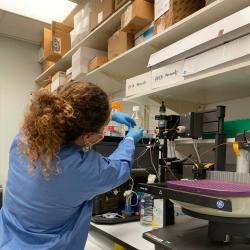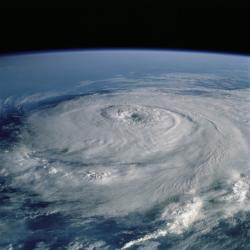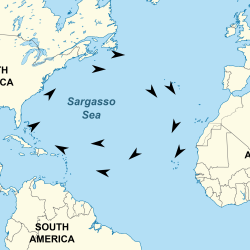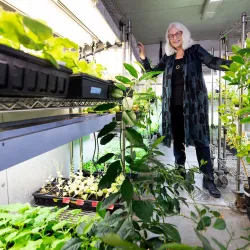Two UMD Professors Named 2016-2017 Jefferson Science Fellows
University of Maryland Professors Karen Lips and Sumant Nigam have been named 2016-2017 Jefferson Science Fellows by the U.S. Department of State and the U.S. Agency for International Development (USAID). The innovative fellows program engages the nation’s academic scientists, engineers and physicians in U.S. foreign policy.
Fellows spend one year at the State Department or USAID for an on-site assignment in Washington, D.C., that could involve extended stays at U.S. foreign embassies and missions. They will remain available to the U.S. Department of State/USAID for short-term projects over the subsequent five years. Lips and Nigam join faculty member Norma Allewell, professor in the Department of Cell Biology and Molecular Genetics, who was a 2011-2012 Jefferson Fellow.
Lips is a professor in the Department of Biology and a research associate at the Smithsonian Tropical Research Institute and the U.S. Museum of Natural History. A field ecologist, Lips explores how global change affects the biodiversity of amphibians and reptiles in the U.S. and Latin America. She is a Fellow of the American Association for the Advancement of Science, was named a Leshner Leadership Institute Public Engagement Fellow in 2015 and a Leopold Leadership Fellow in 2005. She received the President's Award of the Chicago Zoological Society in 1997, a Bay and Paul Biodiversity Leadership Award in 1998, and the Sabin Award for Amphibian Conservation in 2012. In 2015, Lips received the inaugural University of Maryland Research Communicator Impact Award. Lips earned a bachelor’s degree in zoology from the University of South Florida in 1988 and her Ph.D. from the Department of Biology at the University of Miami, Coral Gables, in 1995.
Nigam, a professor in the Department of Atmospheric and Oceanic Science and the Earth System Science Interdisciplinary Center, studies atmospheric general circulation and teleconnections, climate dynamics, tropical ocean-atmosphere interaction, aerosols and Asian monsoon, and Great Plains hydroclimate variability and droughts. One of Nigam’s current research focuses involves unraveling the natural variability and secular change components of the climate record to advance understanding of the recent warming of the northern continents. He chairs the Climate Variability and Change Committee of the American Meteorological Society, chairs the Advisory Panel for the National Center for Atmospheric Research’s (NCAR) Climate and Global Dynamics Laboratory, and serves on the International Commission on Dynamical Meteorology. Nigam was a member of the Climate Research Committee and the Board of Atmospheric Sciences and Climate of the National Academies of Sciences, Engineering, and Medicine from 2008-2012. He previously served as co-chair of the Climate Variability working group of NCAR's Community Climate System Model, editor of the Journal of Climate and director of the large-scale dynamic meteorology program at the National Science Foundation. Nigam is a Fellow of the American Meteorological Society and the Royal Meteorological Society. He earned his master’s degree in physics from the Indian Institute of Technology in 1978 and his Ph.D. in geophysical fluid dynamics from Princeton University in 1984, and he held a postdoctoral position at the Massachusetts Institute of Technology from 1984 to 1987.
The 2016-2017 Jefferson Science Fellows class is the twelfth selected since the program was established in 2003 as an initiative of the Office of the Science and Technology Adviser to the U.S. Secretary of State. The 2016-2017 Fellows will begin their one-year assignments in Washington, DC on August 22, 2016.
Media Relations Contact: Abby Robinson, 301-405-5845, abbyr@umd.edu
Writer: Mary Kearney
University of Maryland
College of Computer, Mathematical, and Natural Sciences
2300 Symons Hall
College Park, MD 20742
www.cmns.umd.edu
@UMDscience
About the College of Computer, Mathematical, and Natural Sciences
The College of Computer, Mathematical, and Natural Sciences at the University of Maryland educates more than 7,000 future scientific leaders in its undergraduate and graduate programs each year. The college's 10 departments and more than a dozen interdisciplinary research centers foster scientific discovery with annual sponsored research funding exceeding $150 million.







